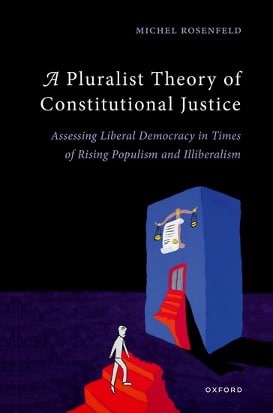A Pluralist Theory of Constitutional Justice
November 23, 2022
Assessing Liberal Democracy in Times of Rising Populism and Illiberalism

Description
In recent years, liberal constitutionalism has come under sharp attack. Globalization has caused huge disparities in wealth, identity-based alienation triggered by mass migration, and accompanying erosions of democracy. Illiberal populists have also adapted the framework of liberal institutionalism, masking their aim to subvert its core values. These developments bring the links between justice and the constitution to the fore, particularly concerning distributive justice in its three dimensions of material redistribution, identitarian recognition, and democratic representation.
A Pluralist Theory of Constitutional Justice by Michel Rosenfeld (Oxford University Press 2022) provides a systematic account of the central role of distributive justice in the normative legitimation of liberal constitutions. The requirements of distributive justice are highly contested, and constitutions are susceptible to influencing those they govern. By drawing on Rawls’ insight that distributive justice calls for “constitutional essentials”, Rosenfeld advances the thesis that liberal constitutions must incorporate certain “justice essentials” which figure as a minimum that ought to be met regardless of prevailing disagreements over competing conceptions of the good. All liberal constitutions may vary on how they seek to harmonize the ethnos and the demos. The justice essentials require aiming at an equilibrium between ethnos and demos along three essential dimensions: that of the universal (or of the constitutional unit’s community of communities); that of the singular as typified by the individual who adheres to the relevant constitutional pact; and the plural as configured by the interplay between constitutionally relevant competing collective units spreading through the polity. Moreover, the aim of distributive justice in this latter context is to achieve proportionate accommodation among the constitutional unit’s universal, singular, and plural interests.
The book is divided into three parts. Part one examines the current legal, economic, political, and ideological developments that pose challenges to the normative viability of liberal constitutionalism. It consists of two chapters and it examines the current conditions wrought by the thrust of globalization and the counterthrust of balkanization. Chapter 1 details the level of fracture and alienation that have surged as by-products of globalization. Law increasingly looms as abstract, distant, elusive, and oppressive, as a plurality of transnational legal regimes overlap with domestic ones. In addition, a repoliticization of religion spilling over to other strongly invested identitarian units, such as ethnic or linguistic communities with exclusivist tendencies has rendered politics increasingly tribal. Chapter 2 concentrates on the novel and unsettling disruptions to patterns of distributive justice regarding wealth and other material burdens and benefits attributable to globalization and associated developments. The disruptions in question pose vexing new challenges to constitutions relating to their obligations to secure material redistributions consistent with the justice essentials.
Part two offers a rereading of philosophical and jurisprudential literature that sheds crucial light on the relationship between constitution and justice. Chapter 3 examines the vexing confrontation between law as an abstract self-referential system and solidarity among those subjected to it in terms of the historical encounter between Kelsen and Freud. Chapter 4 concentrates on those who, unlike Kelsen, regard law as ultimately reducible or largely absorbable into politics or economics. Relating to politics, it contrasts Carl Schmitt to CLS; and relating to economics, Marx to Posner. Chapter 5 reassesses the Kantian tradition steeped in the decoupling of justice from the good, by concentrating on three contemporary thinkers: Rawls and Habermas who are within the Kantian tradition, and Dworkin who shares Rawls’ liberal egalitarianism. Finally, Chapter 6 juxtaposes Derrida’s concept of irreducible singularity leading to the impossibility of justice to Agamben’s breakdown of law into a coupling of a glorifying spectacle derived from the remnants of a Christian political theology with the technicalities of administration.
Part three makes the case for a thoroughly pluralistic approach in the quest for the justice essentials. Part two’s analysis makes it clear that neither approaches from the top, namely from the universal, nor from the bottom, namely from the singular, can satisfactorily carve out a common ground that ought to garner consensus on the justice essentials. Part three seeks to demonstrate that starting from the middle, namely from the plural, affords the best means to achieve the justice essentials amidst widespread disagreements regarding the substantive requirements of distributive justice. Chapter 7 sets out the case for comprehensive pluralism which, in contrast to Isaiah Berlin’s value pluralism, is pluralistic all the way up and all the way down. Chapter 8 focuses on certain fixed minima that constitute a perquisite to maximizing plurality and that carve out a workable conception of the justice essentials. The book concludes by stressing that pluralist justice essentials, while at times difficult to achieve, provide the best hope for the preservation of liberal constitutionalism and against legitimation of illiberal and populist appropriations of the latter’s tools for anti-pluralist purposes.
